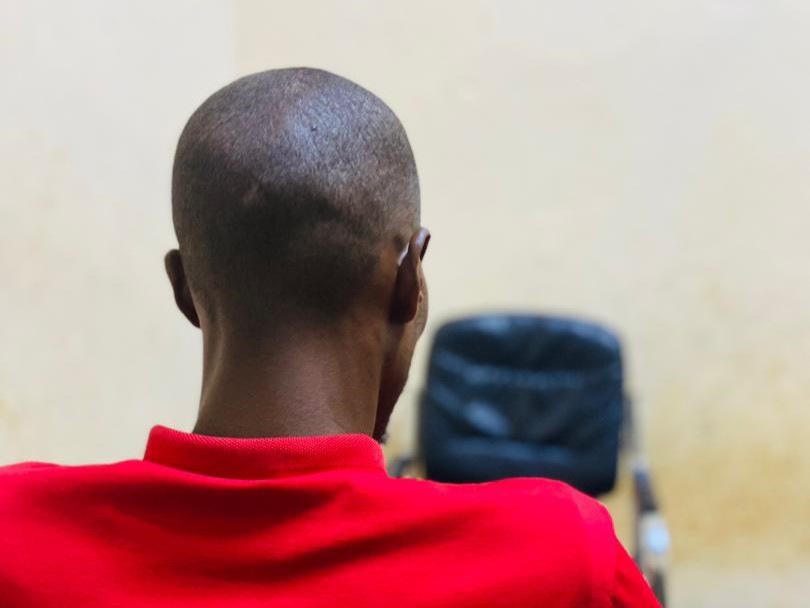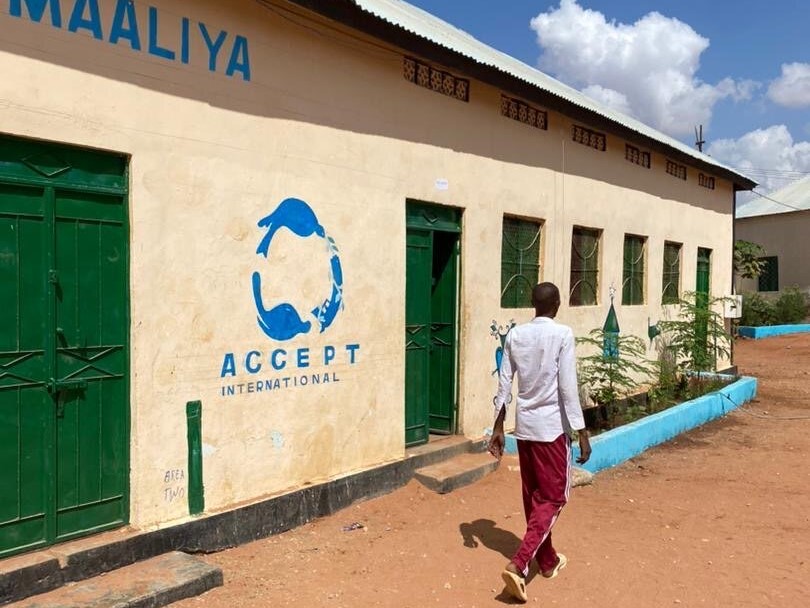January 30, 2024
 The Somalia Division promotes the surrender of individuals from the so-called violent extremist organization Al-Shabaab and implements initiatives to help surrendered combatants and arrested individuals deradicalize and reintegrate into society. Furthermore, in collaboration with the Somali government, we have held dialogue forums and other events aimed at involving the broader community and considering how to achieve peace for society as a whole.
The Somalia Division promotes the surrender of individuals from the so-called violent extremist organization Al-Shabaab and implements initiatives to help surrendered combatants and arrested individuals deradicalize and reintegrate into society. Furthermore, in collaboration with the Somali government, we have held dialogue forums and other events aimed at involving the broader community and considering how to achieve peace for society as a whole.
This time, we enlisted the help of Ahmed, a former pirate and our local staff member in Somalia, to interview Faisal (pseudonym), a beneficiary we support at the Rehabilitation Center* in central Somalia. Faisal spoke on various themes, including his hobbies, changes he feels through the rehabilitation program, and what he believes is necessary to break the chain of hatred.
*Rehabilitation Center: A facility operated by our organization. It provides comprehensive programs including basic education, Islamic re-education seminars, care counseling through dialogue, and vocational training, aiming to empower beneficiaries to think independently and become agents of peace.
Interview with Faisal
1. Faisal’s self-introduction
Ahmed: Thank you for agreeing to this interview. To start, could you introduce yourself to our readers?
Faisal: Hello, readers. My name is Faisal. I’m from southwestern Somalia. Thank you for having me today.
Ahmed: Faisal, nice to meet you. Let’s start with something casual. What are your hobbies, and what do you like about your country?
Faisal: My hobbies are sports like soccer and running.
What I like about my country? For food, I love honey, butter, and fruits that grow well in Somalia like mangoes, bananas, and watermelons. I also enjoy fresh things like camel milk. Of course, I love Somalia’s culture and traditions too. Especially a game that uses traditional dances – I really love that game and play it with everyone at the rehabilitation center.
2. Joining Al-Shabaab and life in the groups
Ahmed: You sometimes play soccer at the rehabilitation center, right?
Now, I’d like to hear about Faisal’s background. Can you tell us what life was like back in your hometown?
Faisal: Back home, I grew up in a poor family. We didn’t have money for school or madrasa (Islamic schools). So, when I heard that Al-Shabaab had set up a madrasa in the village where you could study Islam for free, I ended up getting involved with the group. Most of the young men in the village had joined Al-Shabaab. It wasn’t because I harbored hatred towards the government or Somali society that I got involved with Al-Shabaab.
Ahmed: After joining the group, what was life like in Al-Shabaab?
Faisal: I joined to study Islam, but life was like being a prisoner. I couldn’t speak freely or make my own choices. I was just used by people who didn’t care about me at all. While I was in the group, I worried about the future and lost almost all hope. My only hope was to leave the group someday and be free.
Ahmed: So that’s why you decided to leave the group.
Faisal: Exactly. I realized that if I stayed, I might not be able to live a good life, not just in this world but in the next one too. That’s why I resolved to leave the group.
Ahmed: What kind of guidance, education, and training did you receive from Al-Shabaab?
Faisal: They taught us a little about three books concerning “monotheism,” “prayer,” and ‘jihad’ (which originally means “striving” in Arabic, but is often used by so-called violent extremist organizations to mean violent struggle). But they didn’t want to teach us much. Because they didn’t want us to understand the true meaning of those books. There are pages in those books forbidding the killing of innocent people, but they didn’t want us to see that. Looking back now, I think we were being indoctrinated with their ideology through those lectures.
 ▲Faisal at the Rehabilitation Center.
▲Faisal at the Rehabilitation Center.
3. Attending the rehabilitation program / What he believes is necessary to break the chain of hatred
Ahmed: How did your views on Islam change after taking the Islamic studies seminar at the rehabilitation Center?
Faisal: I believed in Islam before the rehabilitation program and still do now, but my perspective is different. At the rehabilitation center, I learned and understood the true meaning of Islam. I realized some of my previous ideas were wrong. Peace, stability, and the spirit of helping each other are what matter. Since coming to the center, learning the meaning of Islam has shown me a path to a better life.
Ahmed: What was it like when you first came to the rehabilitation center? I’d also like to know your impression of the director and Yosuke (Nagai, our organization’s representative).
Faisal: When I was taken from Al-Shabaab to the rehabilitation center, I was worried about what would happen once I arrived. Would I be imprisoned for a long time, or even killed? But when I first met the director and Yosuke, they welcomed me with kind expressions. The director bought me new clothes and books. He introduced me to the other members and asked them to teach me the center’s rules. I was truly happy to meet them and felt, “I’m saved, I’m in peace.” Life with Al-Shabaab was so harsh, so I rested well and slept well.
Both the Center Director and Yosuke are generous and kind. They help us young Somalis and always look out for us.
Ahmed: Yeah, it’s really good that you could come to the center safely. Changing the subject a bit, unfortunately, the cycle of hatred keeps spreading globally with ongoing conflicts like the violence in Gaza. What do you think is needed to stop these negative cycles in Somalia and around the world?
Faisal: I think it’s necessary for Somali scholars to convey to many people that Islam is a religion of peace, not one that advocates war. Islam forbids all kinds of crime and is filled with peace and tranquility.
Additionally, I believe the government should support young people involved in so-called extremist organizations. Many young people, unable to lead good lives due to economic circumstances and lack of education, end up being exploited by these groups.
Above all, I think it’s crucial for each of us to live peacefully ourselves. Not by taking up arms. That’s why, through the programs at this center, we’ll keep exploring ways to live peacefully.
Ahmed: That’s right. I’ll keep supporting Faisal so he can shape the future ahead. Finally, could you tell us about your future goals?
Faisal: In the future, I want to study computer science. I also want to become a salesperson. I hope I can achieve both of these goals someday.
Furthermore, I hope to use what I’ve learned at the rehabilitation center to think and act, even just a little, for the peace of Somalia and the world.
4. Message to our donors:
Ahmad: Faisal, please share a message for Accept International’s donors.
Faisal: We are deeply grateful for your incredible support. You have saved our lives and understand the importance of saving lives. Thank you very much for your support, we receive education, nutritious meals, medical and hygiene care, and financial assistance. Only you, who send your thoughts from Japan, and Accept International are helping us on the front lines of this brutal conflict. I will never forget your support for the rest of my life.
Since this center was established, many young people have been able to leave Al-Shabaab. Before the center was built, there was neither opportunity nor place here in Garamudug to leave Al-Shabaab and return to society. I hope that many more young people will leave the organization and come to learn together at this center.
I sincerely hope you will continue to warmly support us, so that not only I, but many other young people can also gain the opportunity to return to society.
I am grateful for everything you have done for us so far. Truly, thank you always.
This work with young people is only possible thanks to the support of everyone, starting with our “Accept Ambassadors,” who can participate in our activities starting from just 10 USD per month. To rescue more young people entangled in violence, to strongly support them on new paths, and to connect this to resolving terrorism and conflict, we still need much more strength.
To break the chain of hatred, we would be honored if you would walk with us as an Ambassador.
Activity Reports










